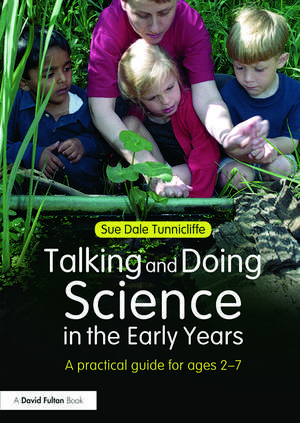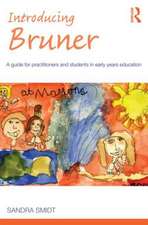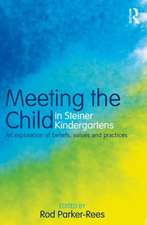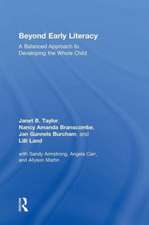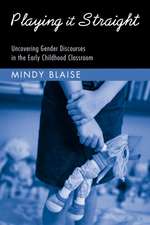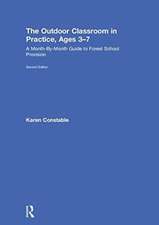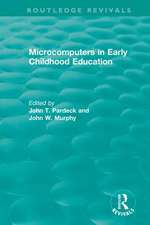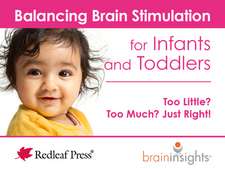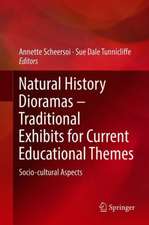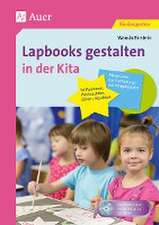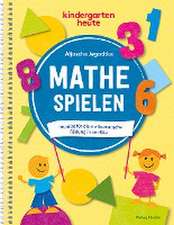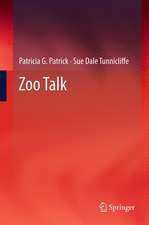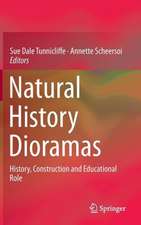Talking and Doing Science in the Early Years: A practical guide for ages 2-7
Autor Sue Dale Tunnicliffeen Limba Engleză Paperback – 13 mai 2013
This accessible book introduces the simplest form of the principles and the big ideas of science and provides a starting point for encouraging children to have an interest and experiential understanding of basic science and engineering. It shows you how you can support young children in exploring everyday phenomena and develop their scientific language skills through readily available resources and hands-on experiences. Each chapter focuses on a different aspect of science and includes:
- a summary of the ‘big ideas’ to refresh your own scientific knowledge;
- numerous activities that encourage young children to observe, question and carry out their own investigations;
- a usefil list of everyday resources and relevant vocabulary.
| Toate formatele și edițiile | Preț | Express |
|---|---|---|
| Paperback (1) | 207.96 lei 6-8 săpt. | |
| Taylor & Francis – 13 mai 2013 | 207.96 lei 6-8 săpt. | |
| Hardback (1) | 765.43 lei 6-8 săpt. | |
| Taylor & Francis – 14 mai 2013 | 765.43 lei 6-8 săpt. |
Preț: 207.96 lei
Preț vechi: 244.92 lei
-15% Nou
Puncte Express: 312
Preț estimativ în valută:
39.80€ • 41.40$ • 32.86£
39.80€ • 41.40$ • 32.86£
Carte tipărită la comandă
Livrare economică 14-28 aprilie
Preluare comenzi: 021 569.72.76
Specificații
ISBN-13: 9780415690904
ISBN-10: 0415690900
Pagini: 192
Ilustrații: 10 black & white tables, 7 black & white halftones, 3 black & white line drawings
Dimensiuni: 174 x 246 x 13 mm
Greutate: 0.36 kg
Ediția:New.
Editura: Taylor & Francis
Colecția Routledge
Locul publicării:Oxford, United Kingdom
ISBN-10: 0415690900
Pagini: 192
Ilustrații: 10 black & white tables, 7 black & white halftones, 3 black & white line drawings
Dimensiuni: 174 x 246 x 13 mm
Greutate: 0.36 kg
Ediția:New.
Editura: Taylor & Francis
Colecția Routledge
Locul publicării:Oxford, United Kingdom
Public țintă
Postgraduate, Professional, Professional Practice & Development, and UndergraduateCuprins
1. About the book; 2. Background to early years science; 3. Resources, language and skills for everyday science; 4. Living things - ourselves; 5. Other living things - animals; 6. Other living things - plants; 7. Other living things - fungi, bacteria and algae; 8. Forces - pushes and pulls; 9. Structures; 10. Changes; 11. Materials; 12. The built environment; 13. Outside - the natural environment: soils, sky, weather
Notă biografică
Sue Dale Tunnicliffe is a senior lecturer in Science Education at the Institute of Education, University of London, UK.
Recenzii
'This is a very practical and helpful book that will help you to build on children's natural curiousity, generating scientific ideas, vocabulary and awareness through the home, setting, natural world around and everyday provision.' - Martine Hovath, Eye Magazine (Early Years Educator)
'This highly practical book will help teachers and parents alike to develop their children’s natural curiosity about the world around them … and have fun doing it too!' - Sue Fenoughty, NAEE Executive
'Throughout the text the reader is invited to engage with pertinent ideas and concepts to stimulate their thinking in order to develop their practice to promote children’s scientific interest and facilitate their understanding of science.' - Dr. Jenny Byrne, Senior Lecturer, The University of Southampton, UK
'This highly practical book will help teachers and parents alike to develop their children’s natural curiosity about the world around them … and have fun doing it too!' - Sue Fenoughty, NAEE Executive
'Throughout the text the reader is invited to engage with pertinent ideas and concepts to stimulate their thinking in order to develop their practice to promote children’s scientific interest and facilitate their understanding of science.' - Dr. Jenny Byrne, Senior Lecturer, The University of Southampton, UK
Descriere
Young children are intuitive, emergent scientists - they observe, raise hypotheses, experiment and notice patterns. Most of our everyday actions at home and in other settings, inside and outside, have a scientific basis and it is through these early experiences that children formulate their ideas about the world in which we live.
This accessible book introduces the simplest form of the principles and the big ideas of science and provides a starting point for encouraging children to have an interest and experiential understanding of basic science and engineering. It shows you how you can support young children in exploring everyday phenomena and develop their scientific language skills through readily available resources and hands-on experiences.
This accessible book introduces the simplest form of the principles and the big ideas of science and provides a starting point for encouraging children to have an interest and experiential understanding of basic science and engineering. It shows you how you can support young children in exploring everyday phenomena and develop their scientific language skills through readily available resources and hands-on experiences.
